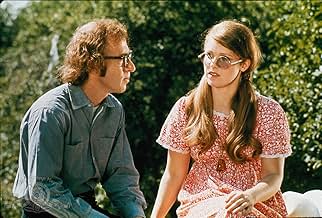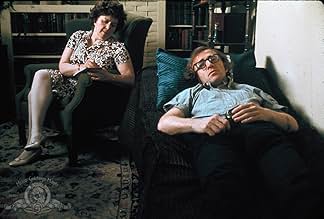IMDb रेटिंग
6.9/10
39 हज़ार
आपकी रेटिंग
जब एक अनाड़ी न्यूयॉर्क निवासी को उसकी एक्टिविस्ट प्रेमिका द्वारा छोड़ दिया जाता है, तो वह एक छोटे लैटिन अमेरिकी राष्ट्र की यात्रा करता है और उसके नवीनतम विद्रोह में शामिल हो जाता है.जब एक अनाड़ी न्यूयॉर्क निवासी को उसकी एक्टिविस्ट प्रेमिका द्वारा छोड़ दिया जाता है, तो वह एक छोटे लैटिन अमेरिकी राष्ट्र की यात्रा करता है और उसके नवीनतम विद्रोह में शामिल हो जाता है.जब एक अनाड़ी न्यूयॉर्क निवासी को उसकी एक्टिविस्ट प्रेमिका द्वारा छोड़ दिया जाता है, तो वह एक छोटे लैटिन अमेरिकी राष्ट्र की यात्रा करता है और उसके नवीनतम विद्रोह में शामिल हो जाता है.
- पुरस्कार
- 2 कुल नामांकन
Nati Abascal
- Yolanda
- (as Natividad Abascal)
Miguel Ángel Suárez
- Luis
- (as Miguel Suarez)
René Enríquez
- Diaz
- (as Rene Enríquez)
Tigre Pérez
- Perez
- (as Tigre Perez)
फ़ीचर्ड समीक्षाएं
Bananas is like a cookie-batter of all of those early Woody Allen jokes all plopped into a bowl and shaken around. It's a film loaded with political jokes, but without a direct focus aside from Cuba and dictators and the like. There are numerous sexual jokes, including one of Woody's funniest scenes involving a magazine (the buying and holding on a subway, very silent comedy-like). And even Howard Cosell becomes an iconic figure in Woody's comedy in the brilliant opening scenes. The plot is very loose, so if you're looking for that look elsewhere. Also, to put it mildly, some of the jokes may not work at all for some viewers of today. But it's the go-for-broke irreverence of the picture that has it still worth viewing today. Much of Woody's own verbal bits are very good, but it's also worth to note how the physical comedy- while crude and a little off-key- also has a good ring to it. Unlike the director's later films, you can still sense that he's trying to 'get' how to make a film, and so in trying to do anything he can think of to get a laugh, of course, some of it doesn't work. For example, in Cuba the gag where the gargantuan pile of dung is carried down the stairs with the Lain music in the background gives a grin, but not as big a laugh as might be intended. Indeed, this might be Woody's most 'immature' film, while still containing some of his more biting, satirical jabs at dictators and oddball politics. Woody would still have this wild, go-for-broke style of humor more akin to some of his quirkier short stories in other films of the early 70s. While this isn't as successful in that regard as Sleeper or Love and Death, I'd still watch it again if it was on TV; even the romantic subplot, undercooked in comparison with the rest of the more satirical stuff, is interesting.
Woody Allen's second film as co-writer/director/star (not including "What's Up, Tiger Lily?") is a grab-bag of lunatic revue sketches, some of them hilarious. Spurned by his activist girlfriend, product-testing schnook in New York City quits his job and heads to a strife-ridden Latin American country to become a part of their revolution. Trenchant political satire must have looked outrageous in 1971, but time has made a few of these gags gruesomely topical and accurate (but no less funny). Targets include man-woman sexual matters (territory Allen was spot-on with right from the start), television commentary (sent up brilliantly), urban violence, Catholicism, psychiatry, assassinations, a Marx Brothers-styled courtroom, Miss America and...J. Edgar Hoover. The pacing seldom flags, but Allen's screenplay (penned with his "Take the Money and Run" partner, Mickey Rose) sags in the middle--perhaps he should have kept the action going in NYC a little longer. Terrific music score from Marvin Hamlisch, adept comedic work from the entire crazy cast (including deadpan Howard Cosell and Roger Grimsby as themselves). **1/2 from ****
By the time he got to Bananas, Woody Allen was reaching new heights in absurdist comedy. The idea of covering a South American revolution as a sporting
event certainly was original one. Even getting to the point of getting the voice
of American sports Howard Cossell to join the fun.
Allen is refining his schlepp persona in Bananas. Although he divorced his leading lady Louise Lasser in real life the two worked well together here. Allen tries to get a relationship going, but Lasser is interested in social causes. She has a bleeding heart for the people of the South American country of San Marcos and gives Woody his walking papers.
So off Allen goes to San Marcos as the schlepp from Brooklyn mixes with all kinds of folks there from dictator Carlos Montalban right down to the Che Guevara revolutionaries.
So many absurd moments in Bananas to count. My favorite is ordering takeout for the revolutionary army from a South American version of a Jewish delicatessen.
Definitely a must for Woody Allen.
Allen is refining his schlepp persona in Bananas. Although he divorced his leading lady Louise Lasser in real life the two worked well together here. Allen tries to get a relationship going, but Lasser is interested in social causes. She has a bleeding heart for the people of the South American country of San Marcos and gives Woody his walking papers.
So off Allen goes to San Marcos as the schlepp from Brooklyn mixes with all kinds of folks there from dictator Carlos Montalban right down to the Che Guevara revolutionaries.
So many absurd moments in Bananas to count. My favorite is ordering takeout for the revolutionary army from a South American version of a Jewish delicatessen.
Definitely a must for Woody Allen.
When asked why he titled his third feature-length picture 'Bananas,' Woody Allen replied, "because there's no bananas in it." This, in a nutshell, pretty much summarises the general tone of the film. During the first ten years of his directing career, it's interesting to see Allen slowly developing his craft; as the years go by, from 'Take the Money and Run (1969)' to 'Sleeper (1973),' {and culminating in 'Annie Hall (1977)'} we notice how he learned to assimilate an unrelated collection of gags into a mature, cohesive narrative. 'Bananas (1971)' sits somewhere in the middle of all this, with a more developed story than its predecessors, but maintaining its roots as an anarchic comedy, much in the same vein as films like 'Duck Soup (1933)' and 'Monty Python and the Holy Grail (1975).' Though I had not anticipated enjoying 'Bananas' very much, I must say that the film provided countless moments of immeasurable hilarity. Though slightly uneven in parts {as is often the case, some jokes hit while others miss}, the film delivers the promised laughs.
The storyline is characteristically simple and absurd. After a revolution breaks out in the small South American nation of San Marcos, a mediocre, unintellectual New Yorker, Fielding Mellish (Allen), travels there to impress his ex-girlfriend (Louise Lasser). After the fascist government tries to have him assassinated, poor Fielding falls in with the rebel gangs, somehow eventually becoming the President of the Latin American republic. This absurd plot line allows Allen to pile one gag on top of another, and, interestingly, the story itself never seems to lose its way or go off on any tangents. The film's satirical take on war, with the Vietnam War still raging in 1971, was very timely, and Allen also aims a few jabs at the media's handling of warfare in the ridiculous and inspired opening, ABC's Wide World of Sports arrives in San Marcos to commentate the assassination of the current President. Later, Howard Cosell returns to host the consummation of Fielding's marriage, with an enthusiastic crowd watching the awkward couple tussling beneath the covers. 'Bananas' is a type specimen of one of Woody Allen's "early, funny movies."
The storyline is characteristically simple and absurd. After a revolution breaks out in the small South American nation of San Marcos, a mediocre, unintellectual New Yorker, Fielding Mellish (Allen), travels there to impress his ex-girlfriend (Louise Lasser). After the fascist government tries to have him assassinated, poor Fielding falls in with the rebel gangs, somehow eventually becoming the President of the Latin American republic. This absurd plot line allows Allen to pile one gag on top of another, and, interestingly, the story itself never seems to lose its way or go off on any tangents. The film's satirical take on war, with the Vietnam War still raging in 1971, was very timely, and Allen also aims a few jabs at the media's handling of warfare in the ridiculous and inspired opening, ABC's Wide World of Sports arrives in San Marcos to commentate the assassination of the current President. Later, Howard Cosell returns to host the consummation of Fielding's marriage, with an enthusiastic crowd watching the awkward couple tussling beneath the covers. 'Bananas' is a type specimen of one of Woody Allen's "early, funny movies."
In the film's opening, sports commentators report on the assassination of the leader of San Marcos, an obscure South American country. Then, the reporters document the takeover of the country by the top general. its tragic and its funny. Meanwhile, Fielding Mellish (Woody Allen) tests products for a leading Manhattan manufacturer but has a hard time getting a date. Unbelievably, an erstwhile and attractive political activist, Nancy (Louise Lasser) comes to Fielding's door, wanting a signature for the condemnation of the San Marcos situation. After many attempts, Mr. Mellish gets a date and the two start a relationship. But, all too soon, Nancy breaks Fielding's heart, insisting he has no leadership qualities. Eureka! Fielding sets off for San Marcos, where he joins the rebels. Will he become the person Nancy wants? This hilarious look at the truly tragic volatility of some Western Hemisphere countries has many wonderful moments and lines. Allen and Lasser are the stars, while a cadre of little known folks blend in nicely. Naturally, the scenery in Manhattan contrasts hugely with those of the "tiny country to the south" while Allen's script is as priceless as ever and his direction is sure-fire. Want to laugh, laugh, laugh? Get Bananas.
क्या आपको पता है
- ट्रिवियाSylvester Stallone appears uncredited as a subway thug. This was one of his earliest film roles, not a cameo. According to website Every Woody Allen Movie, "Allen initially sent Stallone back to the casting agency after deciding he wasn't 'tough-looking' enough. Stallone pleaded with him and eventually convinced him to change his mind".
- गूफ़When Mellish accidentally injects everyone with sodium pentothal during an abduction on a street in San Marcos, there is a blue station wagon parked in front of them with a New York State license plate.
- भाव
Nancy: You're immature, Fielding.
Fielding Mellish: [whining] How am I immature?
Nancy: Well, emotionally, sexually, and intellectually.
Fielding Mellish: Yeah, but what other ways?
- क्रेज़ी क्रेडिटIn the opening credits, the credits flash in time to the music. Additionally, the cards are shot with machine gun fire.
- कनेक्शनFeatured in The Dick Cavett Show: Woody Allen (1971)
- साउंडट्रैकQuiero La Noche
Words and music by Marvin Hamlisch
Sung by The Yomo Toro Trio
[Played during the opening titles and credits]
टॉप पसंद
रेटिंग देने के लिए साइन-इन करें और वैयक्तिकृत सुझावों के लिए वॉचलिस्ट करें
- How long is Bananas?Alexa द्वारा संचालित
विवरण
बॉक्स ऑफ़िस
- बजट
- $20,00,000(अनुमानित)
- दुनिया भर में सकल
- $1,36,200
इस पेज में योगदान दें
किसी बदलाव का सुझाव दें या अनुपलब्ध कॉन्टेंट जोड़ें
































